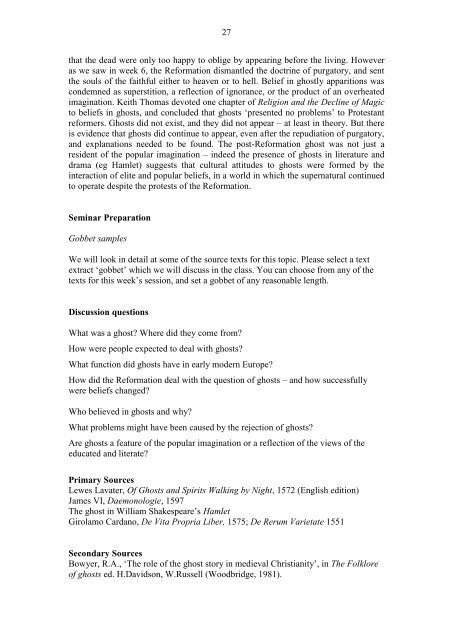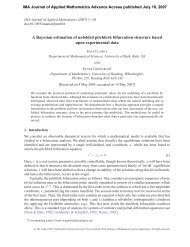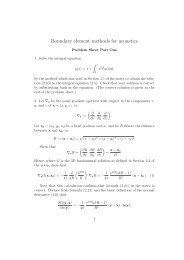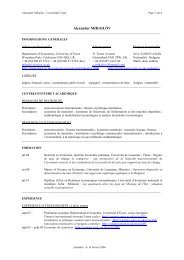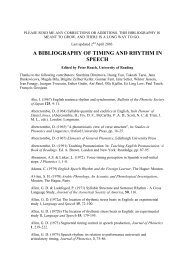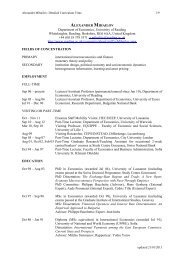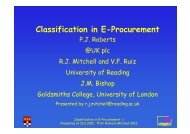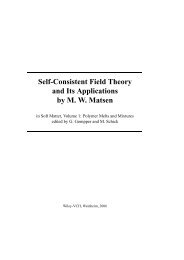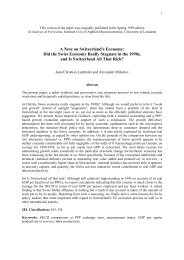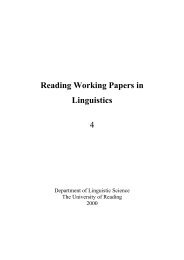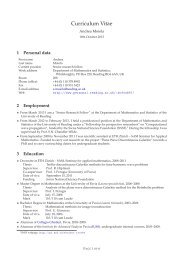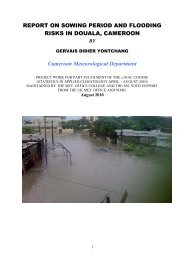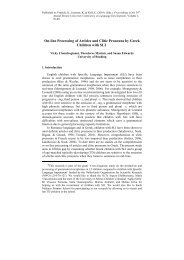Ritual, Myth and Magic in Early Modern Europe - University of Reading
Ritual, Myth and Magic in Early Modern Europe - University of Reading
Ritual, Myth and Magic in Early Modern Europe - University of Reading
You also want an ePaper? Increase the reach of your titles
YUMPU automatically turns print PDFs into web optimized ePapers that Google loves.
27<br />
that the dead were only too happy to oblige by appear<strong>in</strong>g before the liv<strong>in</strong>g. However<br />
as we saw <strong>in</strong> week 6, the Reformation dismantled the doctr<strong>in</strong>e <strong>of</strong> purgatory, <strong>and</strong> sent<br />
the souls <strong>of</strong> the faithful either to heaven or to hell. Belief <strong>in</strong> ghostly apparitions was<br />
condemned as superstition, a reflection <strong>of</strong> ignorance, or the product <strong>of</strong> an overheated<br />
imag<strong>in</strong>ation. Keith Thomas devoted one chapter <strong>of</strong> Religion <strong>and</strong> the Decl<strong>in</strong>e <strong>of</strong> <strong>Magic</strong><br />
to beliefs <strong>in</strong> ghosts, <strong>and</strong> concluded that ghosts ‗presented no problems‘ to Protestant<br />
reformers. Ghosts did not exist, <strong>and</strong> they did not appear – at least <strong>in</strong> theory. But there<br />
is evidence that ghosts did cont<strong>in</strong>ue to appear, even after the repudiation <strong>of</strong> purgatory,<br />
<strong>and</strong> explanations needed to be found. The post-Reformation ghost was not just a<br />
resident <strong>of</strong> the popular imag<strong>in</strong>ation – <strong>in</strong>deed the presence <strong>of</strong> ghosts <strong>in</strong> literature <strong>and</strong><br />
drama (eg Hamlet) suggests that cultural attitudes to ghosts were formed by the<br />
<strong>in</strong>teraction <strong>of</strong> elite <strong>and</strong> popular beliefs, <strong>in</strong> a world <strong>in</strong> which the supernatural cont<strong>in</strong>ued<br />
to operate despite the protests <strong>of</strong> the Reformation.<br />
Sem<strong>in</strong>ar Preparation<br />
Gobbet samples<br />
We will look <strong>in</strong> detail at some <strong>of</strong> the source texts for this topic. Please select a text<br />
extract ‗gobbet‘ which we will discuss <strong>in</strong> the class. You can choose from any <strong>of</strong> the<br />
texts for this week‘s session, <strong>and</strong> set a gobbet <strong>of</strong> any reasonable length.<br />
Discussion questions<br />
What was a ghost? Where did they come from?<br />
How were people expected to deal with ghosts?<br />
What function did ghosts have <strong>in</strong> early modern <strong>Europe</strong>?<br />
How did the Reformation deal with the question <strong>of</strong> ghosts – <strong>and</strong> how successfully<br />
were beliefs changed?<br />
Who believed <strong>in</strong> ghosts <strong>and</strong> why?<br />
What problems might have been caused by the rejection <strong>of</strong> ghosts?<br />
Are ghosts a feature <strong>of</strong> the popular imag<strong>in</strong>ation or a reflection <strong>of</strong> the views <strong>of</strong> the<br />
educated <strong>and</strong> literate?<br />
Primary Sources<br />
Lewes Lavater, Of Ghosts <strong>and</strong> Spirits Walk<strong>in</strong>g by Night, 1572 (English edition)<br />
James VI, Daemonologie, 1597<br />
The ghost <strong>in</strong> William Shakespeare‘s Hamlet<br />
Girolamo Cardano, De Vita Propria Liber, 1575; De Rerum Varietate 1551<br />
Secondary Sources<br />
Bowyer, R.A., ‗The role <strong>of</strong> the ghost story <strong>in</strong> medieval Christianity‘, <strong>in</strong> The Folklore<br />
<strong>of</strong> ghosts ed. H.Davidson, W.Russell (Woodbridge, 1981).


